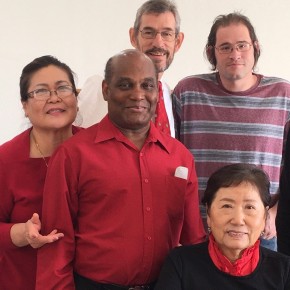Why the USA Has Continual Racial Tension
I was going to write something happy this month, but the nation is gripped. I grieve at the rioting, but in this longer-than-usual post, I hope, as a white guy who’s learned a few things, to share some reasons why the USA continues to have so much racial tension—and my greatest hope. I’ve hyperlinked terms in case you’re not familiar with them.
 My friend Jerry is still in Louisiana, but we still have long talks on the phone. Last year he despaired that injustices against African-Americans like him never seemed to change. And he was most concerned for his grandkids.
My friend Jerry is still in Louisiana, but we still have long talks on the phone. Last year he despaired that injustices against African-Americans like him never seemed to change. And he was most concerned for his grandkids.
Some injustice happens, and I think, “Now things will change.” But mostly they don’t. To get the nation’s attention in the past, people had to arrange for the media to cover things—like the Emmet Till murder or the Birmingham demonstrations. Now people have smartphones. So will things get better? Maybe a bit, but the often-overlooked main issue runs deeper.
Equal Justice Institute director, Bryan Stevenson, says that the greatest evil of American slavery was not involuntary servitude or forced labor. It was the narrative of racial superiority/inferiority created to legitimize slavery. Why? Because after emancipation, that narrative fueled the Black Codes and Jim Crow laws, which in things like lynching (which was a form of terrorism) and convict leasing (where men were imprisoned, sometimes for the slightest reasons, then rented out and worked often to death) were worse than slavery. This narrative carefully evolved the myth away from the slave-era Negro’s being a benign, subservient field hand. If they couldn’t be kept as slaves, at least they could be kept down and out. So the myth of black inferiority intentionally morphed into their being lazy, untrustworthy, up to no good—and to the men was added being lascivious and dangerous. Simply having dark skin came to imply that a person was inferior and dangerous. And this mindset pervaded the entire country, even Canada.
In the past the myth was overtly taught and implied. Today it still lingers as a way of thinking that, if not overt, creeps under the consciousness, pretending not to be there, with many people not even aware it’s there—until it’s revealed and things erupt. Awareness is essential because otherwise people will think and do things without realizing it.
So piece together what you repeatedly see in the news, and it makes total sense. And when a young African-Americans get these messages their whole lives, don’t be surprised when they act them out. (Interestingly, “terrorist” is not part of the myth, and we never see African-American terrorists.)
Jerry helped me understand why black men resist arrest—they’re so frustrated. And statistically, they’re far more likely to be arrested, presumed guilty, and convicted for a given incident than a white person would be. Part of the reason they often get into trouble in the first place is that generations have been disenfranchised. For example, throughout the Great Migration blacks fled the South, but in nearly every city of America they were forced by the practice of redlining into ghettoized areas with limited opportunities. Discrimination has been not only individual but also systemic—did you know that recipients of the post-WWII GI Bill were 99 percent white? From 1877, when post-Civil War Reconstruction ended, African Americans were beaten down, shut out, and denied opportunities—overtly until 1965, then in more subtle ways after that.
Jerry told me how the black nurses at the hospital where he works yell at injured black men who cause trouble because they legitimize and fuel the anti-black narrative. And with him I do my best to feel the existential despair that after all these years since the 1964 Civil Rights Act, one can still be suspected, profiled, stopped, and killed for driving, walking, standing, going to church, even sleeping while black.
Thankfully, everything has gotten much better than it once was, but we still have further to go than most of us realize because the history has been so whitewashed.
Above all the laws or politically correct things that may change, it’s the human heart where the biggest difference is made. And that goes for every race. We can take hope in incremental improvements we see in each successive generation.
Jerry’s and my greatest hope in is the Kingdom of God—God’s reign and activity here on earth. What do you think drove Martin Luther King and all the historically black churches that were foundational to the Civil Rights Movement?
We may not be able to change every person’s heart. But we can determine who we are as people of God—no matter what—and be the message.
Knowing why the nation is as it is, we find the power to change people’s hearts in the Kingdom of God. And it is happening. This gives us something to live and die for. It gives us peace, hope, and strength.
Galatians 3:28 says, “There is neither Jew nor Gentile [or black or white or anything in between], neither slave nor free, nor is there male and female, for you are all one in Christ Jesus.”
This is about more than hoping. It’s about the people of God grasping the reality, then thinking and acting by their new identity in Christ and the life of God’s Spirit in them. We all identify with one color—the blood of Christ. And if any one of us is cut, we all bleed that same color—red.
May God’s Spirit fill you, and through you may he influence the world in which you live.
How might that happen in your life?
—
Thanks to Jerry Green and Sidney Mitchell who vetted this post.







